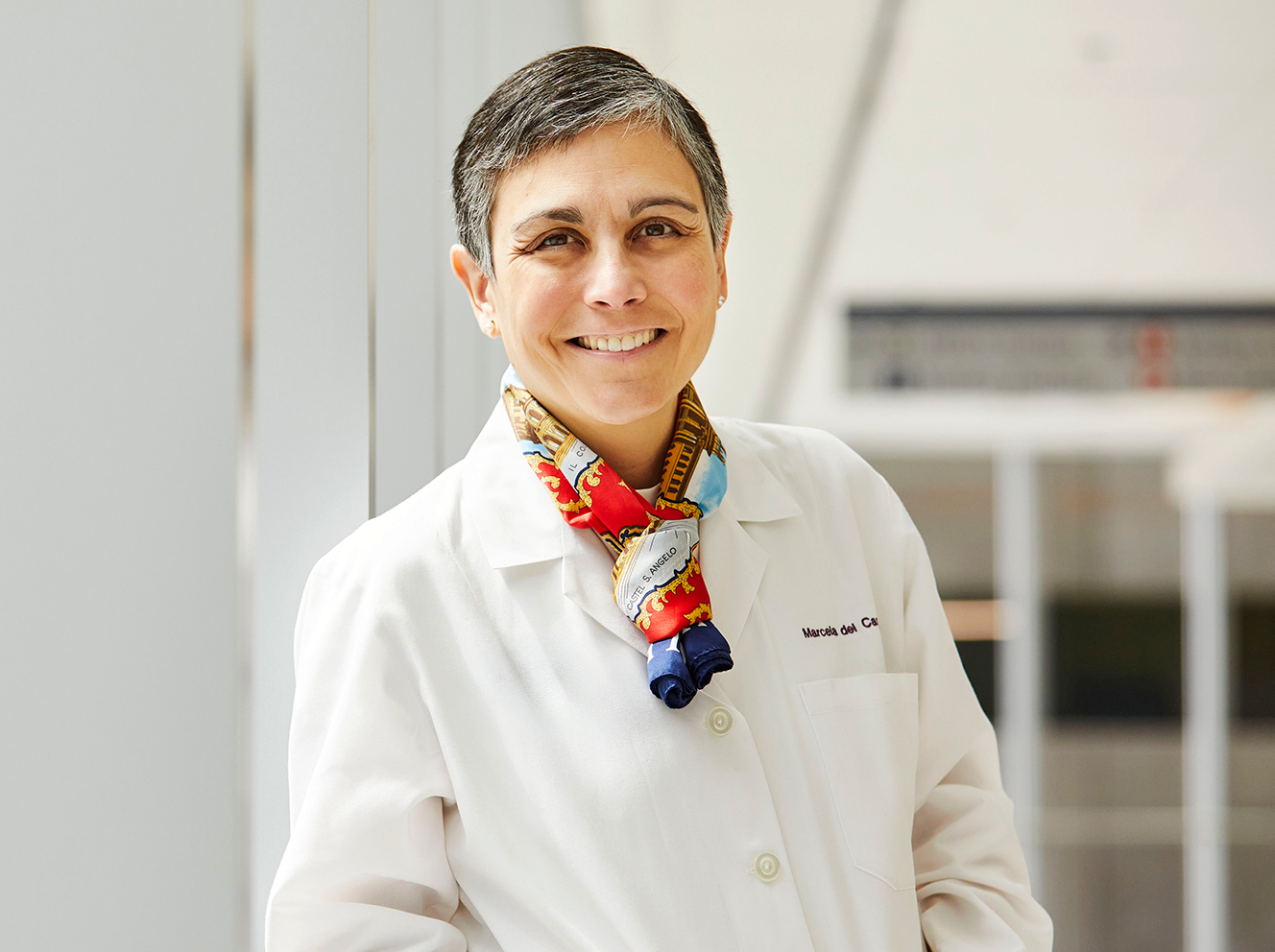Marcela del Carmen, MD, MPH, president of Massachusetts General Hospital and Massachusetts General Physicians Organization, is many things — an accomplished surgeon, a celebrated researcher, a respected leader. But she will be the first to point out that her titles don’t define her; instead, her experiences craft her ever-evolving identity.
“Creating a strong sense of identity was ingrained in me at a young age. I was raised to embrace my roots, but also to be adaptable to change,” says Dr. del Carmen. “It’s this idea that you hold on to the things that make you, you — the things that create stability in your life — while also embracing change in order to innovate and evolve.”
Dr. del Carmen appears to excel at harmonizing amid chaos. When speaking with her, she generates a unique sense of calm. You are more willing to open up and relax. The conversation feels effortless, and 30-minute meetings can quickly stretch to an hour. She’s generous, empathetic and you understand why her patients and colleagues adore her. But this comes as no surprise once you hear her story. Dr. del Carmen seems to have lived a dozen lives up to this point, and she credits these experiences with forming a sense of self that naturally marries her past with her present.
Nicaraguan Roots
Dr. del Carmen’s life began in a diverse household. She was born in Nicaragua to her Nicaraguan mother and Lebanese father. “From an early age, I learned to lean on my upbringing, where there’s a duality of cultures, languages, experiences and even religions,” says Dr. del Carmen. “There was a very strong sense of family values, community service on my mom’s side, and, for my dad, a focus on working really hard, discipline and education.”
She was especially close to her maternal grandfather. She says that as a young child, watching him transition from a Johns Hopkins-trained urologist to the Nicaraguan Minister of Health was her first glimpse into how health care can be applied to make an impact on public health. “My grandfather was committed to serving others, and he showed how you can improve an entire country’s health outcomes by applying your experiences,” says Dr. del Carmen.
“Being a child of war taught me three things that I have carried with me ever since. The first is resiliency. Second, it also makes you focus on the things that are most important, like your immediate family. Finally, it taught me to be adaptable.”
Dr. del Carmen was also living through the Nicaraguan Revolution during these formidable years. “For two years, I recall fighting happening outside my door, right on the streets,” she says. “I remember my parents literally digging out the cabinet in our bathroom and creating a trench where we would try to keep safe during daily civilian bombings.”
The impact of witnessing that level of physical violence from the age of eight to ten years old is not lost on Dr. del Carmen. As both a clinician and someone who’s lived through trauma, she understands, firsthand, what war and disruption can do to a child. Fortunately, her family’s perseverance was stronger than the turmoil and violence they endured.
“Being a child of war taught me three things that I have carried with me ever since,” says Dr. del Carmen. “The first is resiliency. Growing up, hearing about people you know dying, and you doing what you need to do to survive makes you very resilient. Second, it also makes you focus on the things that are most important, like your immediate family. I learned about the value of family, to lean on family and to find that anchor that creates stability. We relied on each other during that time, and it created connections with my siblings and parents that are everlasting. Finally, it taught me to be adaptable.”
The Courage of Adaptability
Dr. del Carmen attributes her learned adaptability to a specific moment during that time. It was when her family decided they must flee Nicaragua. It was a complicated journey — one that would require various means of transportation, permission from the government, access to passports and visas and, eventually, blindly boarding a plane where the pilot would tell you midair where you were landing. A successful end to that journey also wasn’t guaranteed.
Approximately a day before they were to make the uncertain trek, Dr. del Carmen’s mom walked into her room. “She said, ‘We’re going to leave tomorrow because we’re going to try to leave the country. You need to pack a few things, like a set of pajamas and a few articles of clothing,’” says Dr. del Carmen. “I remember asking if I could bring my Barbies, because at only ten, Barbies were my whole world. She said, ‘No, we only can bring two suitcases for five of us and all of our belongings.’”
Dr. del Carmen recalls trying to process this statement as a child — trying to comprehend what that actually meant for her adult parents, who had to leave behind the life, home and safety net they built for their three children. “I didn’t truly understand until I became older, and I commend my parents for creating such a safe space and a new home for us in the United States, where we could live freely in a democracy,” says Dr. del Carmen. “I did learn, in that moment, that I had no choice but to be flexible. I had to adapt to a new life and to change for a greater goal.”
This story is the first of a three-part series, spotlighting Dr. Marcela del Carmen, newly appointed president of Mass General, president of Massachusetts General Physicians Organization and executive vice president of Mass General Brigham. For part two, click here.

